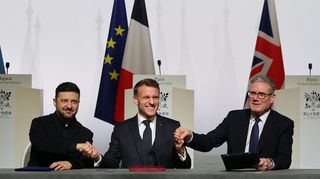Článek
In the South Caucasus, the balance of power is shifting. The 24-hour conflict in Nagorno-Karabakh, an Armenian enclave within Azerbaijani territory, ended with the capitulation of local forces. After decades of conflict, Azerbaijan claims that it is taking control of the mountainous region. What led to the newest flare up of the conflict? And what will be its consequences?
You can listen to a special episode of the podcast 5:59 in the audio player:
A significant change in the South Caucasus is unfolding following a brief 24-hour conflict. Azerbaijan managed to defeat ethnic Armenian forces in Nagorno-Karabakh in a remarkably short time. Both sides are now discussing the region's future governance.
Speaking to 5:59 podcast, Alissa de Carbonnel, Europe and Central Asia Deputy programme Director at the International Crisis Group (ICG), highlights a decade-long buildup to this violence, with several clashes between Armenian and Azerbaijani forces over Karabakh. In a previous six-week war in 2020, Baku emerged victorious, gaining substantial territory.
However, Azerbaijan's ultimate goal was to annex all of Nagorno-Karabakh, experts point out. This led to the rapid military campaign this week, initiated by authoritarian leader Ilham Aliyev, despite previous denials of using force.
Reports of many wounded (civilians and defence forces) in the now isolated Martakert and Martuni areas of Nagorno Karabakh, they have been unable to be evacuated for medical treatment. No real number provided by NK authorities on losses due to contact being lost. pic.twitter.com/Nn6kz2svIZ
— Nagorno Karabakh Observer (@NKobserver) September 22, 2023
During its offensive, Azerbaijan vowed to fight until Baku's objectives were met, essentially aiming to dismantle the institutions in Nagorno-Karabakh established since the 1990s and eliminate this separate entity.
The Karabakh separatists have not officially admitted defeat. The ceasefire they formally declared doesn't reflect the reality on the ground. Analyst de Carbonnel suggests it's more accurate to call it a surrender, as separatist authorities agreed to lay down arms due to the pressure from the offensive.
Czech version of the episode with Alissa de Carbonnel
Přeložený díl s analytičkou Alissou de Carbonnelovou z nevládní Mezinárodní krizové skupiny (International Crisis Group, ICG) o situaci v Náhorním Karabachu.
The main concern now is the future of the residents of Nagorno-Karabakh, where around 120,000 ethnic Armenians live. According to de Carbonnel, its fate will largely depend on how Azerbaijan's approach. Historically, Azerbaijan has not seen it as something worth discussing in peace talks with Armenia.
Following its swift campaign, Baku has promised that people in the region will have the same rights like other inhabitants of Azerbaijani territory. However, according to the ICG expert, there are significant concerns with the Armenian community in Karabakh voicing its fear of possible retribution of Azerbaijani forces.
„There is no trust. The situation over the past nine months (when Azerbaijan intensified pressure to isolate the region) has been really bad, and now there has been fighting for the second time in the last three years. So, naturally, the population is incredibly nervous,“ says Alissa de Carbonnel.
How strong is the concern that the civilian population in Karabakh could be targeted once it's not protected by ethnic Armenian forces? And what is the role of the neighboring big powers - namely Russia and Turkey - in the conflict? How will the latest developments affect Russia's position in the Caucasus?
Listen to the whole interview via the audio player at the top of the article.
Sound design a hudba: Martin Hůla
Zdroje audioukázek: YouTube – United Nations (@unitednations), Twitter – Marut Vanyan (@marutvanian), Telegram – Mash (@Breakingmash)
Podcast 5:59
Zpravodajský podcast Seznam Zpráv. Jedno zásadní téma každý všední den za minutu šest. To nejdůležitější dění v Česku, ve světě, politice, ekonomice, sportu i kultuře optikou Seznam Zpráv.
Poslouchejte na Podcasty.cz, Spotify, Apple Podcasts a dalších podcastových aplikacích. Sledujte nás na X, Instagramu, Threads nebo Bluesky.
Archiv všech dílů najdete na našich stránkách. Své postřehy, připomínky nebo tipy nám pište prostřednictvím sociálních sítí nebo na e-mail: zaminutusest@sz.cz.














